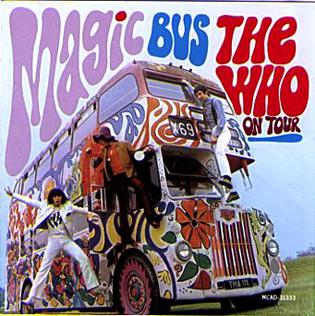
Magic Bus: The Who on Tour is a compilation album by English rock band the Who. It was released as the band's fourth album in the United States by Decca in September 1968 to capitalize on the success of their single of the same name. It is a compilation album of previously released material, and was not issued in the UK, although the album was also released at approximately the same time in Canada. It peaked at #39 on the Billboard 200.

American Beauty is the fifth studio album by rock band the Grateful Dead. Released in November 1970, by Warner Bros. Records, the album continued the folk rock and country music style of their previous album Workingman's Dead, issued earlier in the year.

Music from Big Pink is the debut studio album by the Band. Released in 1968, it employs a distinctive blend of country, rock, folk, classical, R&B, blues, and soul. The music was composed partly in "Big Pink", a house shared by bassist/singer Rick Danko, pianist/singer Richard Manuel and organist Garth Hudson in West Saugerties, New York. The album itself was recorded in studios in New York and Los Angeles in 1968, and followed the band's backing of Bob Dylan on his 1966 tour and time spent together in upstate New York recording material that was officially released in 1975 as The Basement Tapes, also with Dylan. The cover artwork is a painting by Dylan.

1000 Hurts is the third studio album by American indie rock band Shellac, released on August 8, 2000. In its official promotional materials Shellac jokingly described this album as follows: "There are no 12-minute songs on this one. This record is more mean-spirited. Todd sings."

Live/Dead is the first official live album released by the rock band Grateful Dead. Recorded over a series of concerts in early 1969 and released later the same year, it was the first live rock album to use 16-track recording.

Tea for the Tillerman is the fourth studio album by singer-songwriter Cat Stevens, released in November 1970.

Into the Fire is the fifth studio album by the Canadian rock singer Bryan Adams. It was co-written by Jim Vallance. It was released on 30 March 1987 by A&M Records as the follow-up album to the chart-topping Reckless (1984). Into the Fire peaked at number seven on the US Billboard 200 chart and reached the Top 10 in several other nations. Six singles were released from the album: "Heat of the Night", "Hearts on Fire", "Victim of Love", "Only the Strong Survive", "Into the Fire" and "Another Day".
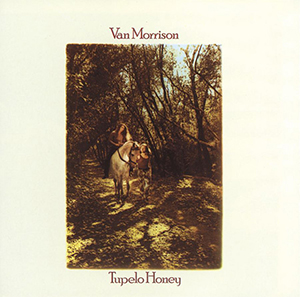
Tupelo Honey is the fifth studio album by Northern Irish singer-songwriter Van Morrison. It was released in October 1971 by Warner Bros. Records. Morrison had written all of the songs on the album in Woodstock, New York, before his move to Marin County, California, except for "You're My Woman", which he wrote during the recording sessions. Recording began at the beginning of the second quarter of 1971 at Wally Heider Studios in San Francisco. Morrison moved to the Columbia Studios in May 1971 to complete the album.

Transformer is the second solo studio album by American recording artist Lou Reed. Produced by David Bowie and Mick Ronson, the album was released in November 1972 by RCA Records. It is considered an influential landmark of the glam rock genre, anchored by Reed's most successful single, "Walk on the Wild Side", which touched on controversial topics of sexual orientation, gender identity, prostitution and drug use. Although Reed's self-titled debut solo album had been unsuccessful, Bowie had been an early fan of Reed's former band The Velvet Underground and used his fame to promote Reed, who had not yet achieved mainstream success.

Aoxomoxoa is the third studio album by the Grateful Dead. It was one of the first rock albums to be recorded using 16-track technology. The title is a meaningless palindrome, usually pronounced.

Tim Hardin 1 is the debut album by folk artist Tim Hardin, released in 1966 on Verve Records.
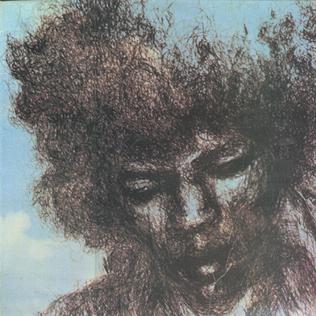
The Cry of Love is a posthumous album by American rock singer-songwriter and guitarist Jimi Hendrix. Recorded primarily in 1970, it features new material that Hendrix was working on for his planned fourth studio album before his death later that year. While most of the songs were included on proposed track listings by Hendrix, the final selection was made by recording engineer Eddie Kramer and drummer Mitch Mitchell, with input from manager Michael Jeffery. Hendrix, Kramer, and Mitchell are credited as the album's producers, with Jeffery as the executive producer.

Long John Silver is the seventh studio album by the American rock band Jefferson Airplane, and their last album of all new material until 1989. It was recorded and released in 1972 as Grunt FTR-1007.

In-A-Gadda-Da-Vida is the second studio album by the American rock band Iron Butterfly, released in June 1968. It is most known for its title track, a 17-minute composition which occupies the whole of Side B.

American Dream is the ninth album by the band Crosby, Stills & Nash, their fifth studio album and their second with Neil Young. Released in 1988 on Atlantic Records, it peaked at No. 16 on the Billboard 200 and has been certified platinum by the Recording Industry Association of America. To date, it is their final album of original material to receive either a gold or platinum citation by the RIAA. It is the highest-selling album by Neil Young in the 1980s. The album is dedicated to Jan Crosby, Anne Stills, Susan Nash and Pegi Young.

Sal Valentino is an American rock musician, singer and songwriter, best known as lead singer of The Beau Brummels, subsequently becoming a songwriter as well. The band released a pair of top 20 U.S. hit singles in 1965, "Laugh, Laugh" and "Just a Little". He later fronted another band, Stoneground, which produced three albums in the early 1970s. After reuniting on numerous occasions with the Beau Brummels, Valentino began a solo career, releasing his latest album, Every Now and Then, in 2008.
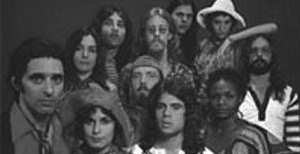
Stoneground was an American rock band formed in 1970 in Concord, California. Originally a trio, Stoneground expanded to a 10-piece band by the time of their eponymous 1971 debut album. The group appeared in two films, Medicine Ball Caravan (1971) and Dracula A.D. 1972 (1972), and released three albums before singer Sal Valentino quit in 1973. Three other band members—Cory Lerios, Steve Price and David Jenkins—left to form pop group Pablo Cruise. Stoneground continued as an act through 1982, with only Tim Barnes and Annie Sampson remaining from the early incarnation of the band. Barnes and Price led a re-formed Stoneground in 2003 and released a studio album the following year.
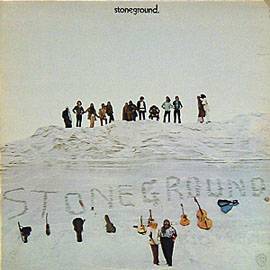
Stoneground is the debut studio album by American rock band Stoneground, released in 1971 on Warner Bros. The album featured seven different lead vocalists, including Sal Valentino on four of the album's ten songs.

Stoneground 3, sometimes stylized as Stoneground Three, is the third album by American rock band Stoneground, released in 1972 on Warner Bros. It was the final studio album to feature the band's original lineup, as eight of the ten members quit shortly after the album's release.
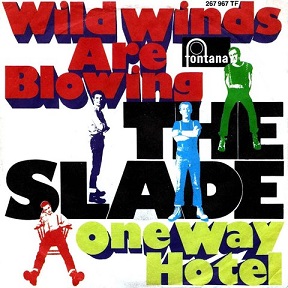
"Wild Winds Are Blowing" is a song by the British rock band Slade, released in 1969 as a non-album single under the name "The Slade". The song was written by Bob Saker and Jack Winsley, and produced by Chas Chandler. It failed to make an appearance in the UK charts.



















